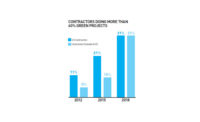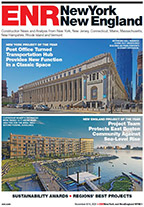
No one in the design and construction industry would disagree that complex construction projects have a wide variety of inherent uncertainties and risks. Those can affect the cost, schedule and quality of a project and the performance of the project team.
However, new research by McGraw Hill Construction, published in the "Managing Uncertainty and Expectations in Building Design and Construction SmartMarket Report," shows that owners, architects and contractors have different views about expectations of perfect performance, causes of uncertainty and the best means to mitigate their impact on projects.
The research demonstrates that all players need to better understand challenges faced by each other in project delivery. That could shift the conversation from who is responsible for unexpected problems to collaborative, proactive ways to manage the issues.
The findings reveal a critical divide between contractors and owners on key issues. Those include the degree of satisfaction owners have with the quality, schedule and cost of their projects. Adding to the disparity, large contracting companies—in this study defined as those with $50 million or more in project value in 2013—report a notably different perspective about uncertainty than smaller companies.
Perfect Performance
Respondents were asked if they believe that perfection is possible: meaning error-free construction documents from the design team and no coordination-related errors or contractor-caused errors or delays by the construction team. Only a small percentage of owners (10%), large contractors (9%) and smaller contractors (13%) believe a perfect set of construction documents is possible, but 21% of owners feel it is reasonable to expect it. However, higher percentages of owners (23%), large contractors (22%) and especially small-to-medium contractors (47%) believe that perfect construction performance is possible, and the majority of owners (73%) believe it is a reasonable expectation. These findings suggest that large contractors who typically do complex projects are more aligned with owners on the difficulty of achieving perfection, yet also that owners may hold contractors to a higher standard of performance expectation than design teams.
Owner Satisfaction
Given the higher percentage of small-to-medium contractors who believe that perfect construction performance is possible, it is not surprising that a higher percentage of them also believe they are always meeting owner expectations for quality, schedule and cost compared with large contractors. Since all respondents were required to have worked on complex projects to qualify for the survey, it's possible that smaller firms may be more specialized and therefore more likely to think of themselves as always meeting client needs.
However, the largest disparity is between the percentage of owners who say their expectations are always met and the percentage of contractors who believe they always meet owners' expectations. The far lower response by the owners demonstrates a fundamental lack of communication that contractors should address to improve client relationships.
Causes of Uncertainty
The study asked respondents to rate the impact of seven factors that cause uncertainty on projects. Large and small contractors mostly agreed on four of those: unforeseen site or construction issues, design omissions, accelerated schedules and task coordination.
However, there was a significant difference in the findings for the three factors represented in the chart. Large contractors point to factors controlled by other players as being most disruptive—such as owner program or design changes and design errors. On the other hand, nearly half (47%) of small-to-medium size companies look inward and say that contractor-caused delays are the most highly disruptive causes—nearly twice the percentage of large contractors.







Post a comment to this article
Report Abusive Comment